Nursing Leadership and Management: Ministry of Health (MOH) Analysis
VerifiedAdded on 2023/04/25
|11
|3407
|156
Report
AI Summary
This report provides a detailed analysis of nursing leadership and management within the context of the healthcare system, specifically focusing on the Ministry of Health (MOH) in Saudi Arabia. The report begins by defining key concepts of nursing leadership and management, emphasizing the importance of effective leadership for achieving healthcare goals. It then delves into the characteristics of effective nurse clinical leaders, highlighting the significance of advocacy, critical thinking, mentoring, and communication skills. The report examines significant concepts, including education and ethics, and their impact on healthcare. It further discusses the current challenges and barriers faced by the healthcare system, such as high medical costs, lack of infrastructure, and cultural/language differences. The report emphasizes the importance of effective communication and quality control within MOH. Finally, the report explores transformational leadership and provides recommendations for improvement, concluding with a summary of key findings and references.
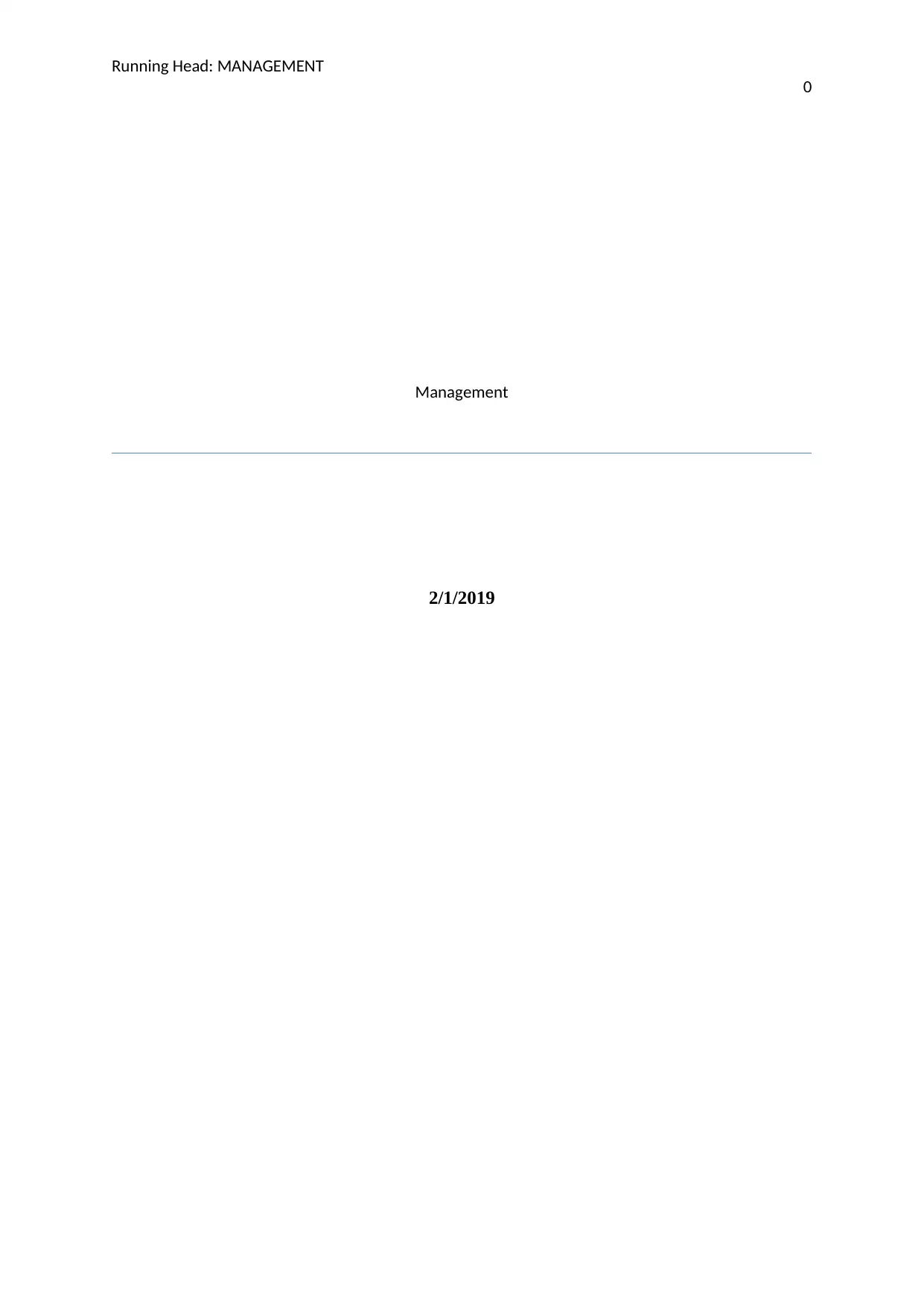
Running Head: MANAGEMENT
0
Management
2/1/2019
0
Management
2/1/2019
Paraphrase This Document
Need a fresh take? Get an instant paraphrase of this document with our AI Paraphraser
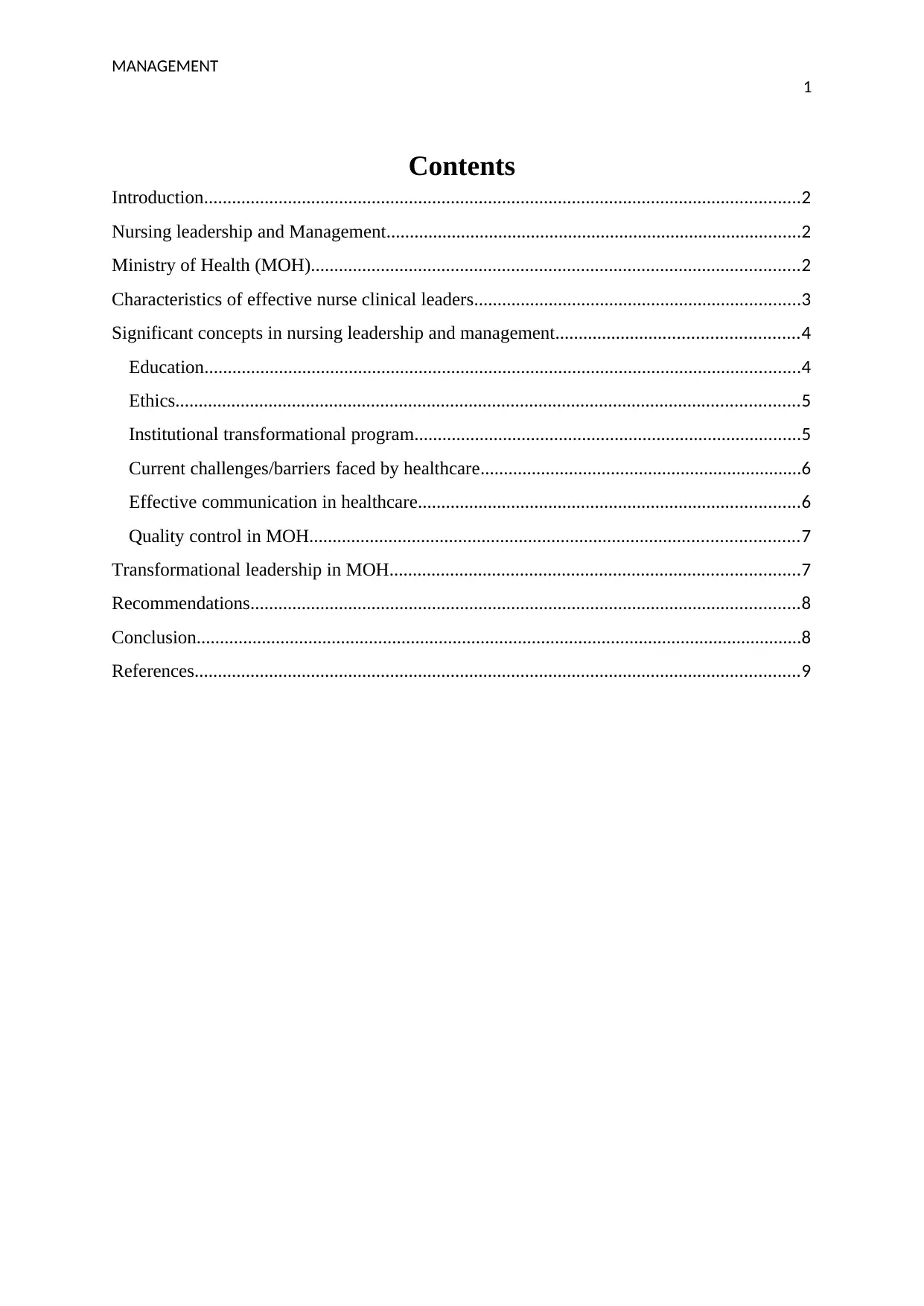
MANAGEMENT
1
Contents
Introduction................................................................................................................................2
Nursing leadership and Management.........................................................................................2
Ministry of Health (MOH).........................................................................................................2
Characteristics of effective nurse clinical leaders......................................................................3
Significant concepts in nursing leadership and management....................................................4
Education................................................................................................................................4
Ethics......................................................................................................................................5
Institutional transformational program...................................................................................5
Current challenges/barriers faced by healthcare.....................................................................6
Effective communication in healthcare..................................................................................6
Quality control in MOH.........................................................................................................7
Transformational leadership in MOH........................................................................................7
Recommendations......................................................................................................................8
Conclusion..................................................................................................................................8
References..................................................................................................................................9
1
Contents
Introduction................................................................................................................................2
Nursing leadership and Management.........................................................................................2
Ministry of Health (MOH).........................................................................................................2
Characteristics of effective nurse clinical leaders......................................................................3
Significant concepts in nursing leadership and management....................................................4
Education................................................................................................................................4
Ethics......................................................................................................................................5
Institutional transformational program...................................................................................5
Current challenges/barriers faced by healthcare.....................................................................6
Effective communication in healthcare..................................................................................6
Quality control in MOH.........................................................................................................7
Transformational leadership in MOH........................................................................................7
Recommendations......................................................................................................................8
Conclusion..................................................................................................................................8
References..................................................................................................................................9
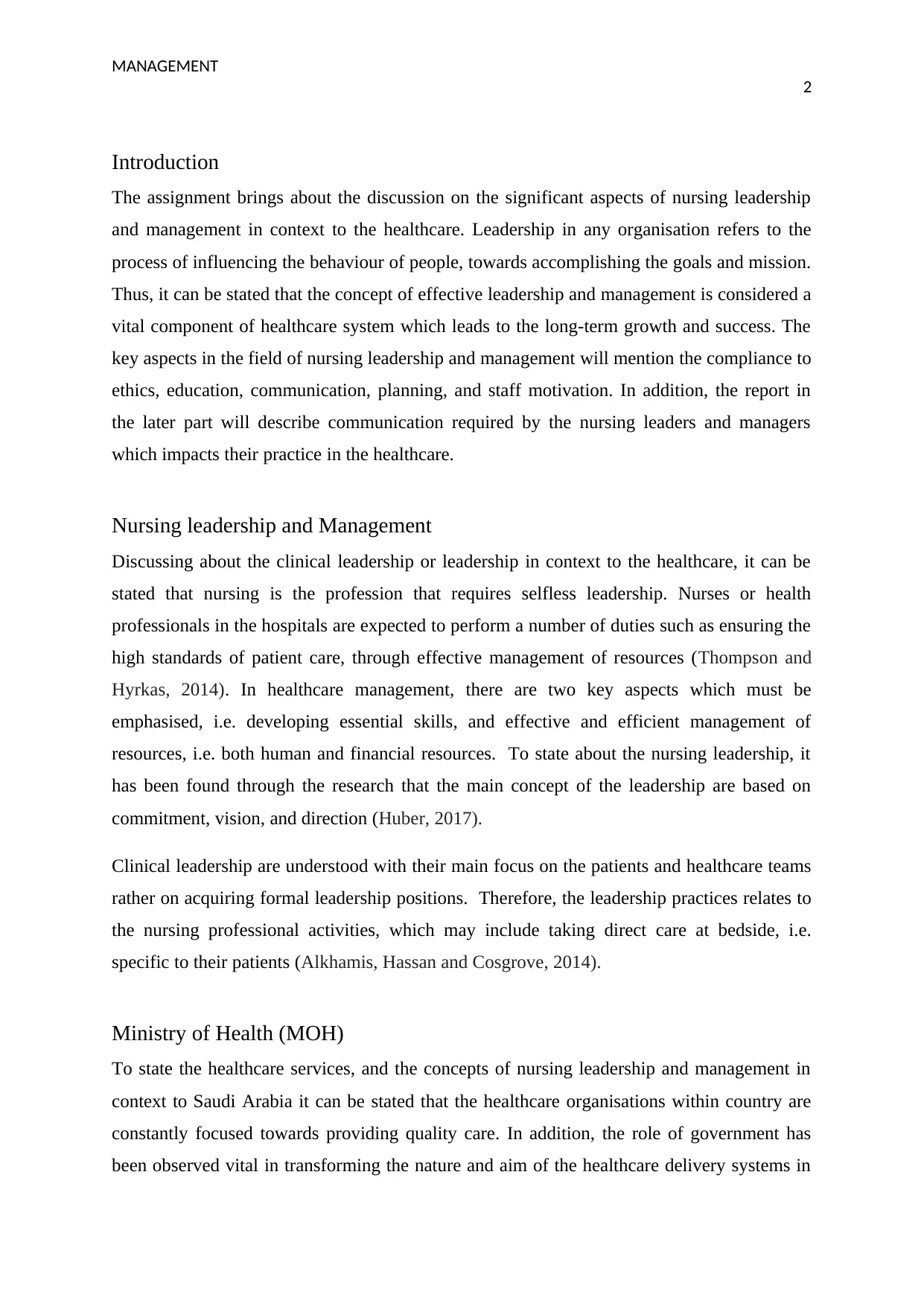
MANAGEMENT
2
Introduction
The assignment brings about the discussion on the significant aspects of nursing leadership
and management in context to the healthcare. Leadership in any organisation refers to the
process of influencing the behaviour of people, towards accomplishing the goals and mission.
Thus, it can be stated that the concept of effective leadership and management is considered a
vital component of healthcare system which leads to the long-term growth and success. The
key aspects in the field of nursing leadership and management will mention the compliance to
ethics, education, communication, planning, and staff motivation. In addition, the report in
the later part will describe communication required by the nursing leaders and managers
which impacts their practice in the healthcare.
Nursing leadership and Management
Discussing about the clinical leadership or leadership in context to the healthcare, it can be
stated that nursing is the profession that requires selfless leadership. Nurses or health
professionals in the hospitals are expected to perform a number of duties such as ensuring the
high standards of patient care, through effective management of resources (Thompson and
Hyrkas, 2014). In healthcare management, there are two key aspects which must be
emphasised, i.e. developing essential skills, and effective and efficient management of
resources, i.e. both human and financial resources. To state about the nursing leadership, it
has been found through the research that the main concept of the leadership are based on
commitment, vision, and direction (Huber, 2017).
Clinical leadership are understood with their main focus on the patients and healthcare teams
rather on acquiring formal leadership positions. Therefore, the leadership practices relates to
the nursing professional activities, which may include taking direct care at bedside, i.e.
specific to their patients (Alkhamis, Hassan and Cosgrove, 2014).
Ministry of Health (MOH)
To state the healthcare services, and the concepts of nursing leadership and management in
context to Saudi Arabia it can be stated that the healthcare organisations within country are
constantly focused towards providing quality care. In addition, the role of government has
been observed vital in transforming the nature and aim of the healthcare delivery systems in
2
Introduction
The assignment brings about the discussion on the significant aspects of nursing leadership
and management in context to the healthcare. Leadership in any organisation refers to the
process of influencing the behaviour of people, towards accomplishing the goals and mission.
Thus, it can be stated that the concept of effective leadership and management is considered a
vital component of healthcare system which leads to the long-term growth and success. The
key aspects in the field of nursing leadership and management will mention the compliance to
ethics, education, communication, planning, and staff motivation. In addition, the report in
the later part will describe communication required by the nursing leaders and managers
which impacts their practice in the healthcare.
Nursing leadership and Management
Discussing about the clinical leadership or leadership in context to the healthcare, it can be
stated that nursing is the profession that requires selfless leadership. Nurses or health
professionals in the hospitals are expected to perform a number of duties such as ensuring the
high standards of patient care, through effective management of resources (Thompson and
Hyrkas, 2014). In healthcare management, there are two key aspects which must be
emphasised, i.e. developing essential skills, and effective and efficient management of
resources, i.e. both human and financial resources. To state about the nursing leadership, it
has been found through the research that the main concept of the leadership are based on
commitment, vision, and direction (Huber, 2017).
Clinical leadership are understood with their main focus on the patients and healthcare teams
rather on acquiring formal leadership positions. Therefore, the leadership practices relates to
the nursing professional activities, which may include taking direct care at bedside, i.e.
specific to their patients (Alkhamis, Hassan and Cosgrove, 2014).
Ministry of Health (MOH)
To state the healthcare services, and the concepts of nursing leadership and management in
context to Saudi Arabia it can be stated that the healthcare organisations within country are
constantly focused towards providing quality care. In addition, the role of government has
been observed vital in transforming the nature and aim of the healthcare delivery systems in
⊘ This is a preview!⊘
Do you want full access?
Subscribe today to unlock all pages.

Trusted by 1+ million students worldwide
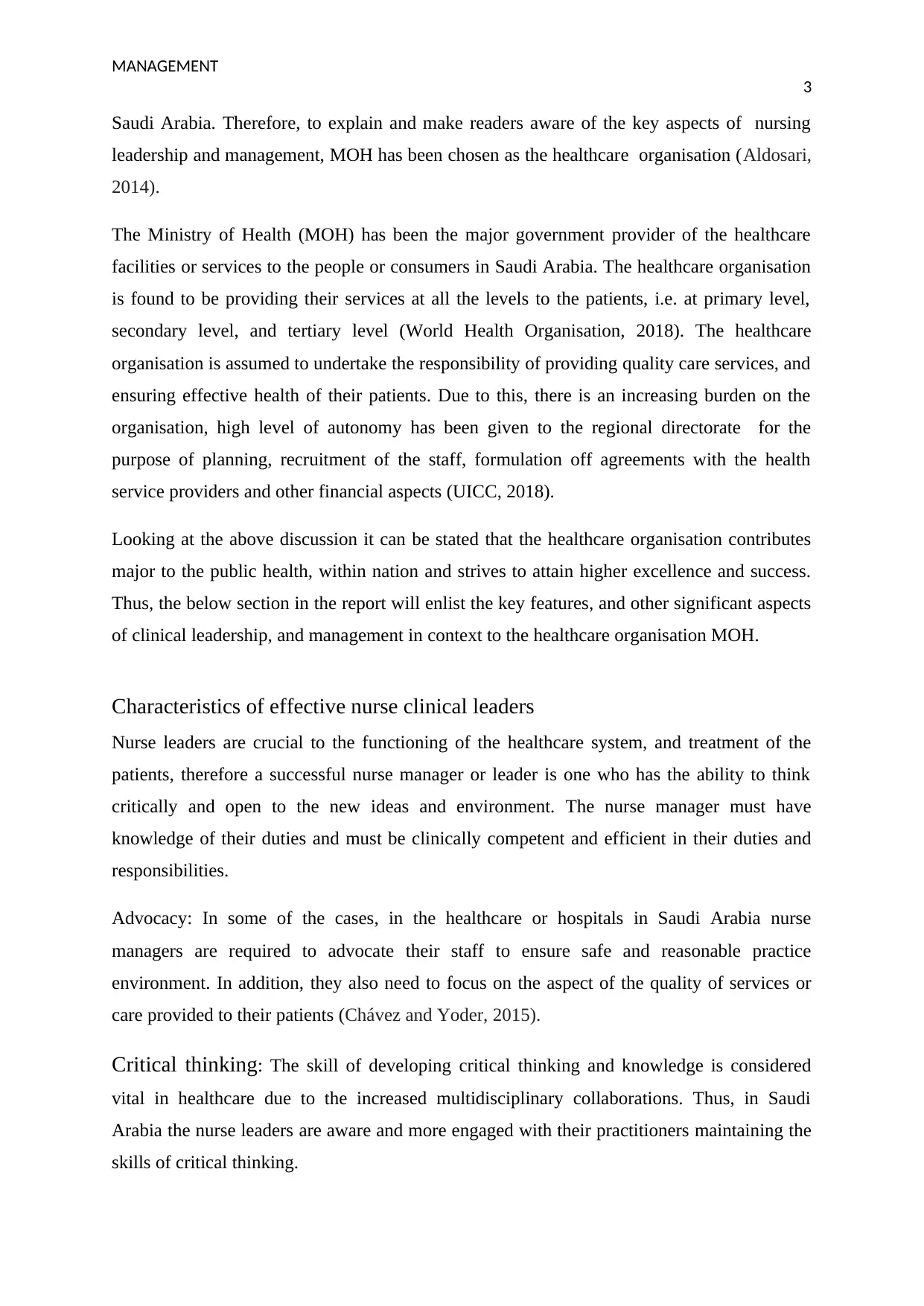
MANAGEMENT
3
Saudi Arabia. Therefore, to explain and make readers aware of the key aspects of nursing
leadership and management, MOH has been chosen as the healthcare organisation (Aldosari,
2014).
The Ministry of Health (MOH) has been the major government provider of the healthcare
facilities or services to the people or consumers in Saudi Arabia. The healthcare organisation
is found to be providing their services at all the levels to the patients, i.e. at primary level,
secondary level, and tertiary level (World Health Organisation, 2018). The healthcare
organisation is assumed to undertake the responsibility of providing quality care services, and
ensuring effective health of their patients. Due to this, there is an increasing burden on the
organisation, high level of autonomy has been given to the regional directorate for the
purpose of planning, recruitment of the staff, formulation off agreements with the health
service providers and other financial aspects (UICC, 2018).
Looking at the above discussion it can be stated that the healthcare organisation contributes
major to the public health, within nation and strives to attain higher excellence and success.
Thus, the below section in the report will enlist the key features, and other significant aspects
of clinical leadership, and management in context to the healthcare organisation MOH.
Characteristics of effective nurse clinical leaders
Nurse leaders are crucial to the functioning of the healthcare system, and treatment of the
patients, therefore a successful nurse manager or leader is one who has the ability to think
critically and open to the new ideas and environment. The nurse manager must have
knowledge of their duties and must be clinically competent and efficient in their duties and
responsibilities.
Advocacy: In some of the cases, in the healthcare or hospitals in Saudi Arabia nurse
managers are required to advocate their staff to ensure safe and reasonable practice
environment. In addition, they also need to focus on the aspect of the quality of services or
care provided to their patients (Chávez and Yoder, 2015).
Critical thinking: The skill of developing critical thinking and knowledge is considered
vital in healthcare due to the increased multidisciplinary collaborations. Thus, in Saudi
Arabia the nurse leaders are aware and more engaged with their practitioners maintaining the
skills of critical thinking.
3
Saudi Arabia. Therefore, to explain and make readers aware of the key aspects of nursing
leadership and management, MOH has been chosen as the healthcare organisation (Aldosari,
2014).
The Ministry of Health (MOH) has been the major government provider of the healthcare
facilities or services to the people or consumers in Saudi Arabia. The healthcare organisation
is found to be providing their services at all the levels to the patients, i.e. at primary level,
secondary level, and tertiary level (World Health Organisation, 2018). The healthcare
organisation is assumed to undertake the responsibility of providing quality care services, and
ensuring effective health of their patients. Due to this, there is an increasing burden on the
organisation, high level of autonomy has been given to the regional directorate for the
purpose of planning, recruitment of the staff, formulation off agreements with the health
service providers and other financial aspects (UICC, 2018).
Looking at the above discussion it can be stated that the healthcare organisation contributes
major to the public health, within nation and strives to attain higher excellence and success.
Thus, the below section in the report will enlist the key features, and other significant aspects
of clinical leadership, and management in context to the healthcare organisation MOH.
Characteristics of effective nurse clinical leaders
Nurse leaders are crucial to the functioning of the healthcare system, and treatment of the
patients, therefore a successful nurse manager or leader is one who has the ability to think
critically and open to the new ideas and environment. The nurse manager must have
knowledge of their duties and must be clinically competent and efficient in their duties and
responsibilities.
Advocacy: In some of the cases, in the healthcare or hospitals in Saudi Arabia nurse
managers are required to advocate their staff to ensure safe and reasonable practice
environment. In addition, they also need to focus on the aspect of the quality of services or
care provided to their patients (Chávez and Yoder, 2015).
Critical thinking: The skill of developing critical thinking and knowledge is considered
vital in healthcare due to the increased multidisciplinary collaborations. Thus, in Saudi
Arabia the nurse leaders are aware and more engaged with their practitioners maintaining the
skills of critical thinking.
Paraphrase This Document
Need a fresh take? Get an instant paraphrase of this document with our AI Paraphraser
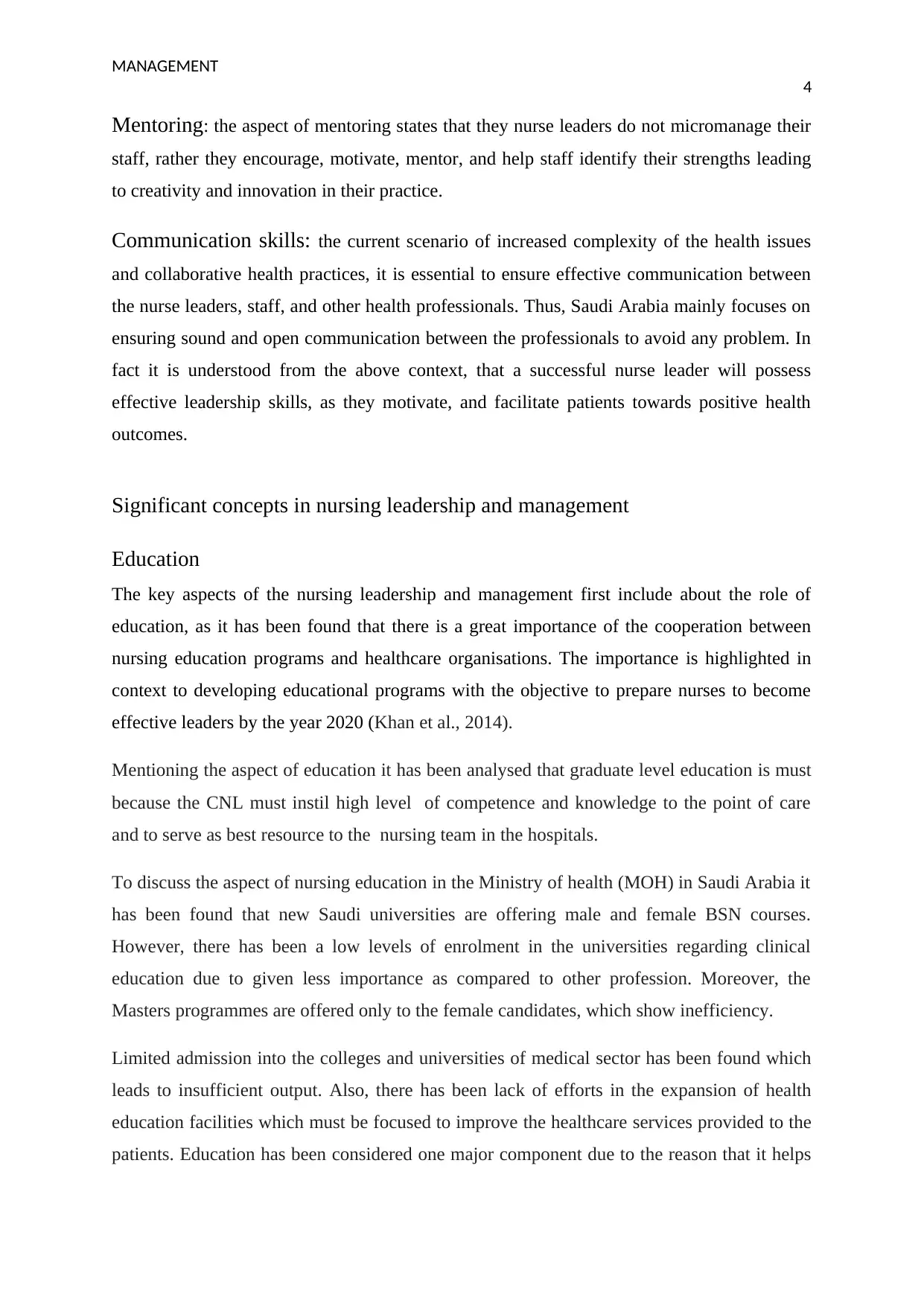
MANAGEMENT
4
Mentoring: the aspect of mentoring states that they nurse leaders do not micromanage their
staff, rather they encourage, motivate, mentor, and help staff identify their strengths leading
to creativity and innovation in their practice.
Communication skills: the current scenario of increased complexity of the health issues
and collaborative health practices, it is essential to ensure effective communication between
the nurse leaders, staff, and other health professionals. Thus, Saudi Arabia mainly focuses on
ensuring sound and open communication between the professionals to avoid any problem. In
fact it is understood from the above context, that a successful nurse leader will possess
effective leadership skills, as they motivate, and facilitate patients towards positive health
outcomes.
Significant concepts in nursing leadership and management
Education
The key aspects of the nursing leadership and management first include about the role of
education, as it has been found that there is a great importance of the cooperation between
nursing education programs and healthcare organisations. The importance is highlighted in
context to developing educational programs with the objective to prepare nurses to become
effective leaders by the year 2020 (Khan et al., 2014).
Mentioning the aspect of education it has been analysed that graduate level education is must
because the CNL must instil high level of competence and knowledge to the point of care
and to serve as best resource to the nursing team in the hospitals.
To discuss the aspect of nursing education in the Ministry of health (MOH) in Saudi Arabia it
has been found that new Saudi universities are offering male and female BSN courses.
However, there has been a low levels of enrolment in the universities regarding clinical
education due to given less importance as compared to other profession. Moreover, the
Masters programmes are offered only to the female candidates, which show inefficiency.
Limited admission into the colleges and universities of medical sector has been found which
leads to insufficient output. Also, there has been lack of efforts in the expansion of health
education facilities which must be focused to improve the healthcare services provided to the
patients. Education has been considered one major component due to the reason that it helps
4
Mentoring: the aspect of mentoring states that they nurse leaders do not micromanage their
staff, rather they encourage, motivate, mentor, and help staff identify their strengths leading
to creativity and innovation in their practice.
Communication skills: the current scenario of increased complexity of the health issues
and collaborative health practices, it is essential to ensure effective communication between
the nurse leaders, staff, and other health professionals. Thus, Saudi Arabia mainly focuses on
ensuring sound and open communication between the professionals to avoid any problem. In
fact it is understood from the above context, that a successful nurse leader will possess
effective leadership skills, as they motivate, and facilitate patients towards positive health
outcomes.
Significant concepts in nursing leadership and management
Education
The key aspects of the nursing leadership and management first include about the role of
education, as it has been found that there is a great importance of the cooperation between
nursing education programs and healthcare organisations. The importance is highlighted in
context to developing educational programs with the objective to prepare nurses to become
effective leaders by the year 2020 (Khan et al., 2014).
Mentioning the aspect of education it has been analysed that graduate level education is must
because the CNL must instil high level of competence and knowledge to the point of care
and to serve as best resource to the nursing team in the hospitals.
To discuss the aspect of nursing education in the Ministry of health (MOH) in Saudi Arabia it
has been found that new Saudi universities are offering male and female BSN courses.
However, there has been a low levels of enrolment in the universities regarding clinical
education due to given less importance as compared to other profession. Moreover, the
Masters programmes are offered only to the female candidates, which show inefficiency.
Limited admission into the colleges and universities of medical sector has been found which
leads to insufficient output. Also, there has been lack of efforts in the expansion of health
education facilities which must be focused to improve the healthcare services provided to the
patients. Education has been considered one major component due to the reason that it helps
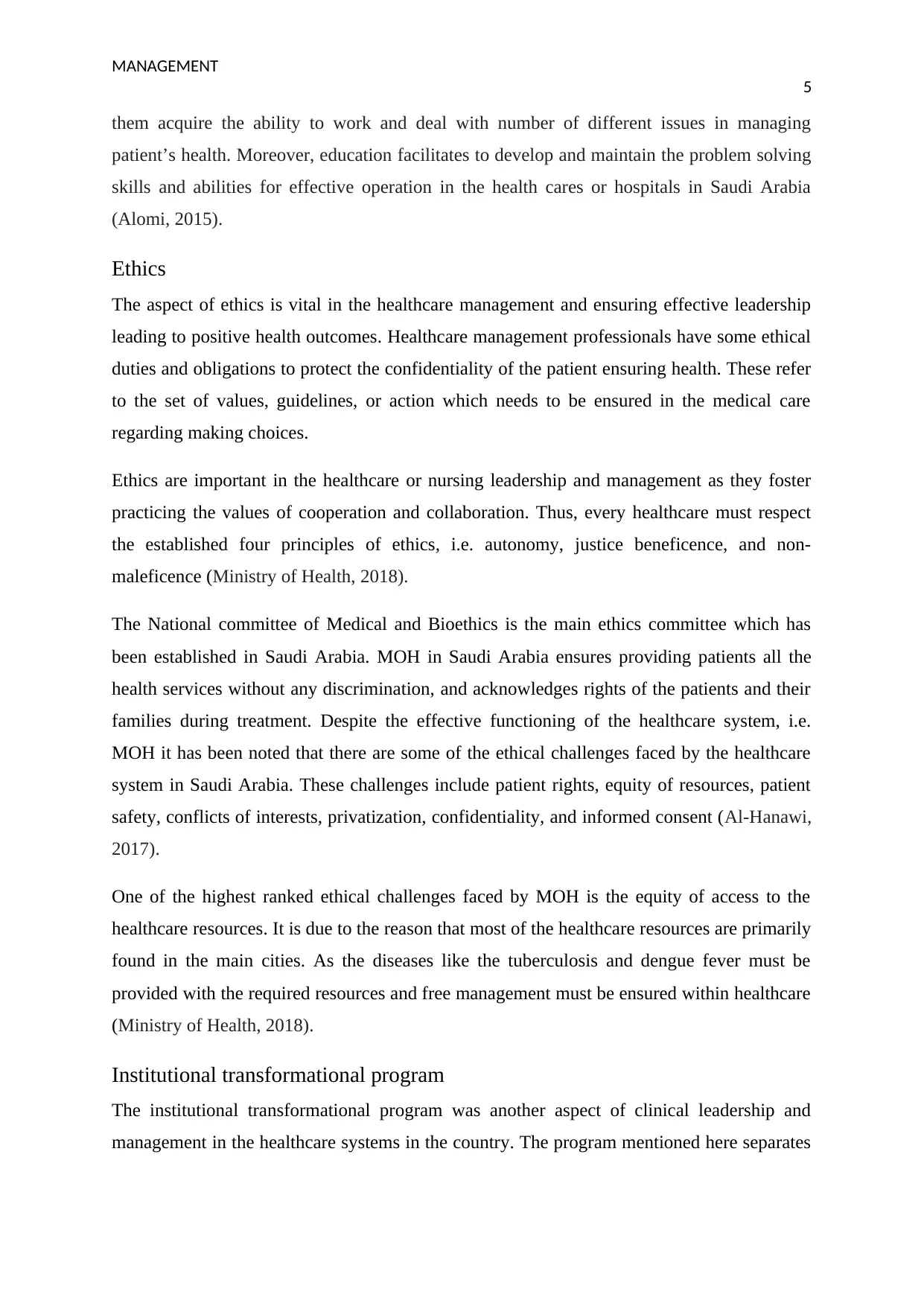
MANAGEMENT
5
them acquire the ability to work and deal with number of different issues in managing
patient’s health. Moreover, education facilitates to develop and maintain the problem solving
skills and abilities for effective operation in the health cares or hospitals in Saudi Arabia
(Alomi, 2015).
Ethics
The aspect of ethics is vital in the healthcare management and ensuring effective leadership
leading to positive health outcomes. Healthcare management professionals have some ethical
duties and obligations to protect the confidentiality of the patient ensuring health. These refer
to the set of values, guidelines, or action which needs to be ensured in the medical care
regarding making choices.
Ethics are important in the healthcare or nursing leadership and management as they foster
practicing the values of cooperation and collaboration. Thus, every healthcare must respect
the established four principles of ethics, i.e. autonomy, justice beneficence, and non-
maleficence (Ministry of Health, 2018).
The National committee of Medical and Bioethics is the main ethics committee which has
been established in Saudi Arabia. MOH in Saudi Arabia ensures providing patients all the
health services without any discrimination, and acknowledges rights of the patients and their
families during treatment. Despite the effective functioning of the healthcare system, i.e.
MOH it has been noted that there are some of the ethical challenges faced by the healthcare
system in Saudi Arabia. These challenges include patient rights, equity of resources, patient
safety, conflicts of interests, privatization, confidentiality, and informed consent (Al-Hanawi,
2017).
One of the highest ranked ethical challenges faced by MOH is the equity of access to the
healthcare resources. It is due to the reason that most of the healthcare resources are primarily
found in the main cities. As the diseases like the tuberculosis and dengue fever must be
provided with the required resources and free management must be ensured within healthcare
(Ministry of Health, 2018).
Institutional transformational program
The institutional transformational program was another aspect of clinical leadership and
management in the healthcare systems in the country. The program mentioned here separates
5
them acquire the ability to work and deal with number of different issues in managing
patient’s health. Moreover, education facilitates to develop and maintain the problem solving
skills and abilities for effective operation in the health cares or hospitals in Saudi Arabia
(Alomi, 2015).
Ethics
The aspect of ethics is vital in the healthcare management and ensuring effective leadership
leading to positive health outcomes. Healthcare management professionals have some ethical
duties and obligations to protect the confidentiality of the patient ensuring health. These refer
to the set of values, guidelines, or action which needs to be ensured in the medical care
regarding making choices.
Ethics are important in the healthcare or nursing leadership and management as they foster
practicing the values of cooperation and collaboration. Thus, every healthcare must respect
the established four principles of ethics, i.e. autonomy, justice beneficence, and non-
maleficence (Ministry of Health, 2018).
The National committee of Medical and Bioethics is the main ethics committee which has
been established in Saudi Arabia. MOH in Saudi Arabia ensures providing patients all the
health services without any discrimination, and acknowledges rights of the patients and their
families during treatment. Despite the effective functioning of the healthcare system, i.e.
MOH it has been noted that there are some of the ethical challenges faced by the healthcare
system in Saudi Arabia. These challenges include patient rights, equity of resources, patient
safety, conflicts of interests, privatization, confidentiality, and informed consent (Al-Hanawi,
2017).
One of the highest ranked ethical challenges faced by MOH is the equity of access to the
healthcare resources. It is due to the reason that most of the healthcare resources are primarily
found in the main cities. As the diseases like the tuberculosis and dengue fever must be
provided with the required resources and free management must be ensured within healthcare
(Ministry of Health, 2018).
Institutional transformational program
The institutional transformational program was another aspect of clinical leadership and
management in the healthcare systems in the country. The program mentioned here separates
⊘ This is a preview!⊘
Do you want full access?
Subscribe today to unlock all pages.

Trusted by 1+ million students worldwide
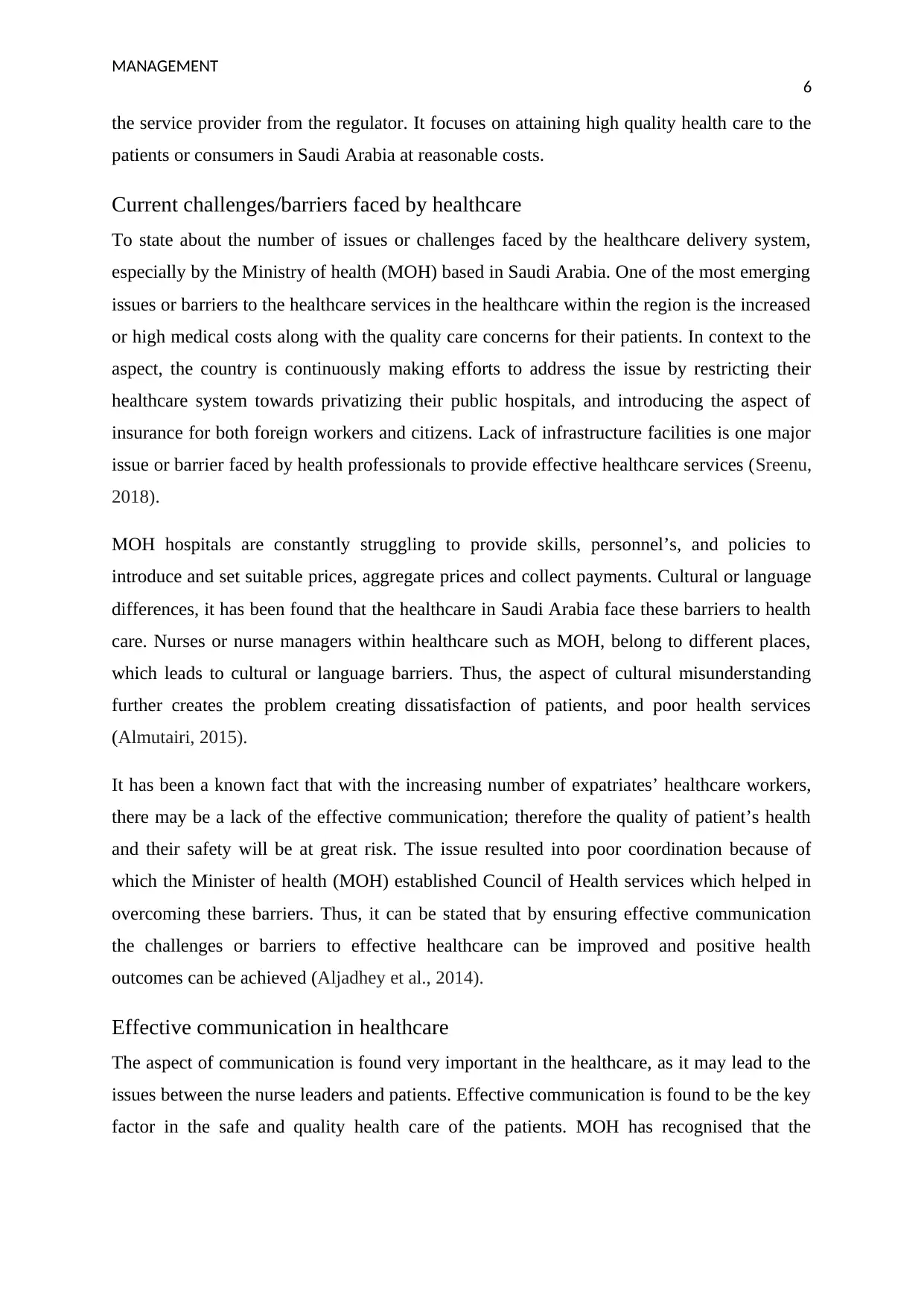
MANAGEMENT
6
the service provider from the regulator. It focuses on attaining high quality health care to the
patients or consumers in Saudi Arabia at reasonable costs.
Current challenges/barriers faced by healthcare
To state about the number of issues or challenges faced by the healthcare delivery system,
especially by the Ministry of health (MOH) based in Saudi Arabia. One of the most emerging
issues or barriers to the healthcare services in the healthcare within the region is the increased
or high medical costs along with the quality care concerns for their patients. In context to the
aspect, the country is continuously making efforts to address the issue by restricting their
healthcare system towards privatizing their public hospitals, and introducing the aspect of
insurance for both foreign workers and citizens. Lack of infrastructure facilities is one major
issue or barrier faced by health professionals to provide effective healthcare services (Sreenu,
2018).
MOH hospitals are constantly struggling to provide skills, personnel’s, and policies to
introduce and set suitable prices, aggregate prices and collect payments. Cultural or language
differences, it has been found that the healthcare in Saudi Arabia face these barriers to health
care. Nurses or nurse managers within healthcare such as MOH, belong to different places,
which leads to cultural or language barriers. Thus, the aspect of cultural misunderstanding
further creates the problem creating dissatisfaction of patients, and poor health services
(Almutairi, 2015).
It has been a known fact that with the increasing number of expatriates’ healthcare workers,
there may be a lack of the effective communication; therefore the quality of patient’s health
and their safety will be at great risk. The issue resulted into poor coordination because of
which the Minister of health (MOH) established Council of Health services which helped in
overcoming these barriers. Thus, it can be stated that by ensuring effective communication
the challenges or barriers to effective healthcare can be improved and positive health
outcomes can be achieved (Aljadhey et al., 2014).
Effective communication in healthcare
The aspect of communication is found very important in the healthcare, as it may lead to the
issues between the nurse leaders and patients. Effective communication is found to be the key
factor in the safe and quality health care of the patients. MOH has recognised that the
6
the service provider from the regulator. It focuses on attaining high quality health care to the
patients or consumers in Saudi Arabia at reasonable costs.
Current challenges/barriers faced by healthcare
To state about the number of issues or challenges faced by the healthcare delivery system,
especially by the Ministry of health (MOH) based in Saudi Arabia. One of the most emerging
issues or barriers to the healthcare services in the healthcare within the region is the increased
or high medical costs along with the quality care concerns for their patients. In context to the
aspect, the country is continuously making efforts to address the issue by restricting their
healthcare system towards privatizing their public hospitals, and introducing the aspect of
insurance for both foreign workers and citizens. Lack of infrastructure facilities is one major
issue or barrier faced by health professionals to provide effective healthcare services (Sreenu,
2018).
MOH hospitals are constantly struggling to provide skills, personnel’s, and policies to
introduce and set suitable prices, aggregate prices and collect payments. Cultural or language
differences, it has been found that the healthcare in Saudi Arabia face these barriers to health
care. Nurses or nurse managers within healthcare such as MOH, belong to different places,
which leads to cultural or language barriers. Thus, the aspect of cultural misunderstanding
further creates the problem creating dissatisfaction of patients, and poor health services
(Almutairi, 2015).
It has been a known fact that with the increasing number of expatriates’ healthcare workers,
there may be a lack of the effective communication; therefore the quality of patient’s health
and their safety will be at great risk. The issue resulted into poor coordination because of
which the Minister of health (MOH) established Council of Health services which helped in
overcoming these barriers. Thus, it can be stated that by ensuring effective communication
the challenges or barriers to effective healthcare can be improved and positive health
outcomes can be achieved (Aljadhey et al., 2014).
Effective communication in healthcare
The aspect of communication is found very important in the healthcare, as it may lead to the
issues between the nurse leaders and patients. Effective communication is found to be the key
factor in the safe and quality health care of the patients. MOH has recognised that the
Paraphrase This Document
Need a fresh take? Get an instant paraphrase of this document with our AI Paraphraser
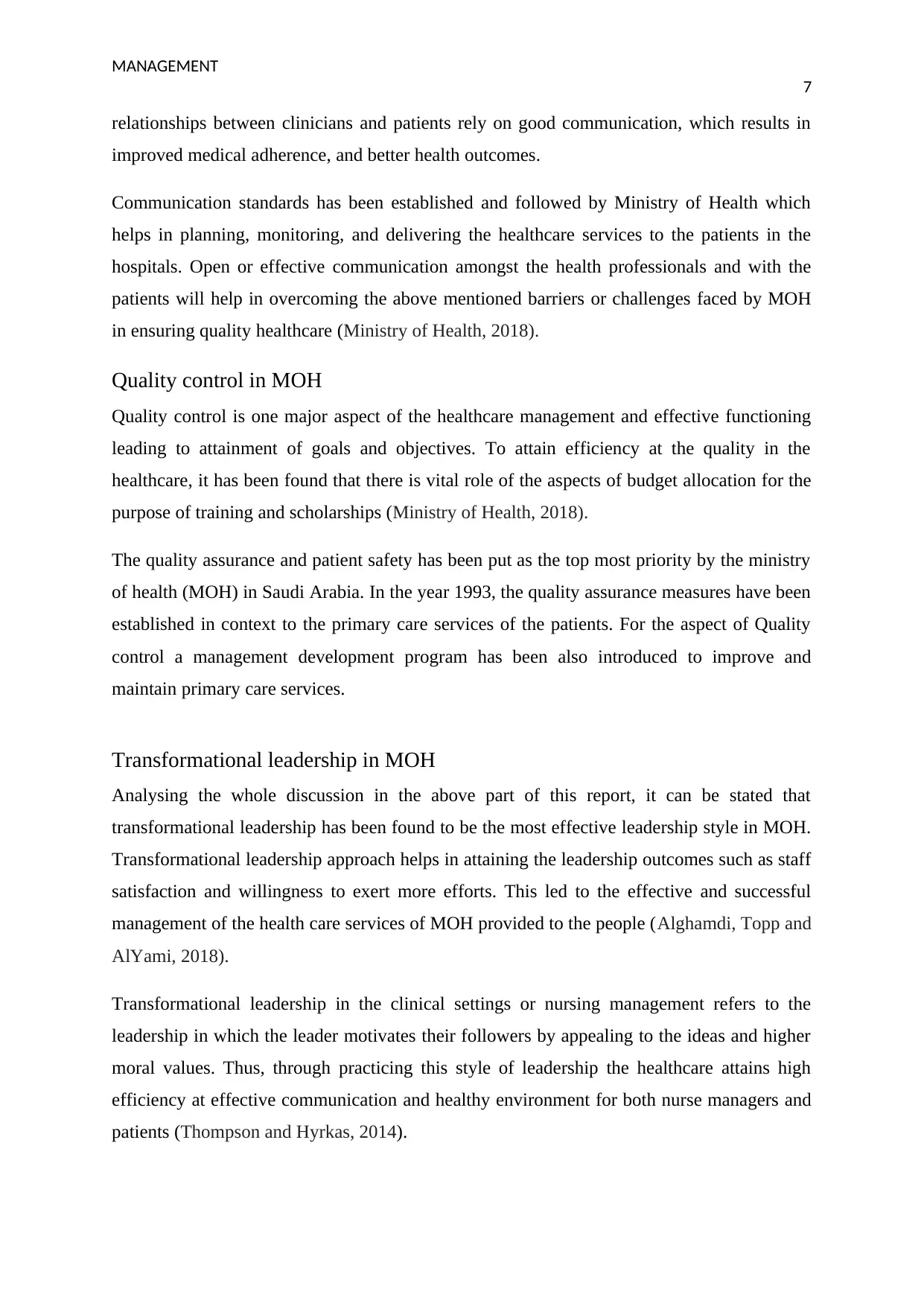
MANAGEMENT
7
relationships between clinicians and patients rely on good communication, which results in
improved medical adherence, and better health outcomes.
Communication standards has been established and followed by Ministry of Health which
helps in planning, monitoring, and delivering the healthcare services to the patients in the
hospitals. Open or effective communication amongst the health professionals and with the
patients will help in overcoming the above mentioned barriers or challenges faced by MOH
in ensuring quality healthcare (Ministry of Health, 2018).
Quality control in MOH
Quality control is one major aspect of the healthcare management and effective functioning
leading to attainment of goals and objectives. To attain efficiency at the quality in the
healthcare, it has been found that there is vital role of the aspects of budget allocation for the
purpose of training and scholarships (Ministry of Health, 2018).
The quality assurance and patient safety has been put as the top most priority by the ministry
of health (MOH) in Saudi Arabia. In the year 1993, the quality assurance measures have been
established in context to the primary care services of the patients. For the aspect of Quality
control a management development program has been also introduced to improve and
maintain primary care services.
Transformational leadership in MOH
Analysing the whole discussion in the above part of this report, it can be stated that
transformational leadership has been found to be the most effective leadership style in MOH.
Transformational leadership approach helps in attaining the leadership outcomes such as staff
satisfaction and willingness to exert more efforts. This led to the effective and successful
management of the health care services of MOH provided to the people (Alghamdi, Topp and
AlYami, 2018).
Transformational leadership in the clinical settings or nursing management refers to the
leadership in which the leader motivates their followers by appealing to the ideas and higher
moral values. Thus, through practicing this style of leadership the healthcare attains high
efficiency at effective communication and healthy environment for both nurse managers and
patients (Thompson and Hyrkas, 2014).
7
relationships between clinicians and patients rely on good communication, which results in
improved medical adherence, and better health outcomes.
Communication standards has been established and followed by Ministry of Health which
helps in planning, monitoring, and delivering the healthcare services to the patients in the
hospitals. Open or effective communication amongst the health professionals and with the
patients will help in overcoming the above mentioned barriers or challenges faced by MOH
in ensuring quality healthcare (Ministry of Health, 2018).
Quality control in MOH
Quality control is one major aspect of the healthcare management and effective functioning
leading to attainment of goals and objectives. To attain efficiency at the quality in the
healthcare, it has been found that there is vital role of the aspects of budget allocation for the
purpose of training and scholarships (Ministry of Health, 2018).
The quality assurance and patient safety has been put as the top most priority by the ministry
of health (MOH) in Saudi Arabia. In the year 1993, the quality assurance measures have been
established in context to the primary care services of the patients. For the aspect of Quality
control a management development program has been also introduced to improve and
maintain primary care services.
Transformational leadership in MOH
Analysing the whole discussion in the above part of this report, it can be stated that
transformational leadership has been found to be the most effective leadership style in MOH.
Transformational leadership approach helps in attaining the leadership outcomes such as staff
satisfaction and willingness to exert more efforts. This led to the effective and successful
management of the health care services of MOH provided to the people (Alghamdi, Topp and
AlYami, 2018).
Transformational leadership in the clinical settings or nursing management refers to the
leadership in which the leader motivates their followers by appealing to the ideas and higher
moral values. Thus, through practicing this style of leadership the healthcare attains high
efficiency at effective communication and healthy environment for both nurse managers and
patients (Thompson and Hyrkas, 2014).
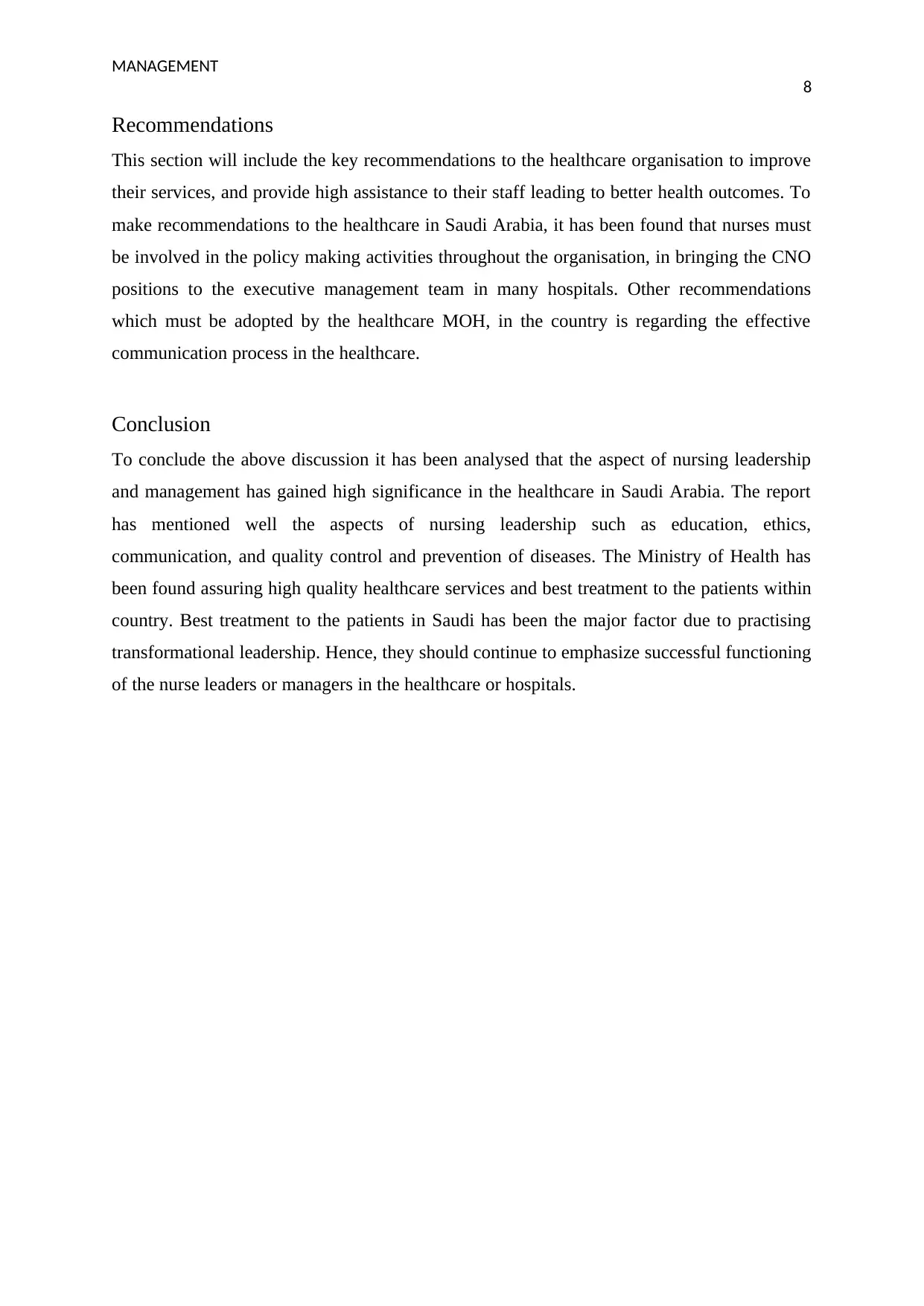
MANAGEMENT
8
Recommendations
This section will include the key recommendations to the healthcare organisation to improve
their services, and provide high assistance to their staff leading to better health outcomes. To
make recommendations to the healthcare in Saudi Arabia, it has been found that nurses must
be involved in the policy making activities throughout the organisation, in bringing the CNO
positions to the executive management team in many hospitals. Other recommendations
which must be adopted by the healthcare MOH, in the country is regarding the effective
communication process in the healthcare.
Conclusion
To conclude the above discussion it has been analysed that the aspect of nursing leadership
and management has gained high significance in the healthcare in Saudi Arabia. The report
has mentioned well the aspects of nursing leadership such as education, ethics,
communication, and quality control and prevention of diseases. The Ministry of Health has
been found assuring high quality healthcare services and best treatment to the patients within
country. Best treatment to the patients in Saudi has been the major factor due to practising
transformational leadership. Hence, they should continue to emphasize successful functioning
of the nurse leaders or managers in the healthcare or hospitals.
8
Recommendations
This section will include the key recommendations to the healthcare organisation to improve
their services, and provide high assistance to their staff leading to better health outcomes. To
make recommendations to the healthcare in Saudi Arabia, it has been found that nurses must
be involved in the policy making activities throughout the organisation, in bringing the CNO
positions to the executive management team in many hospitals. Other recommendations
which must be adopted by the healthcare MOH, in the country is regarding the effective
communication process in the healthcare.
Conclusion
To conclude the above discussion it has been analysed that the aspect of nursing leadership
and management has gained high significance in the healthcare in Saudi Arabia. The report
has mentioned well the aspects of nursing leadership such as education, ethics,
communication, and quality control and prevention of diseases. The Ministry of Health has
been found assuring high quality healthcare services and best treatment to the patients within
country. Best treatment to the patients in Saudi has been the major factor due to practising
transformational leadership. Hence, they should continue to emphasize successful functioning
of the nurse leaders or managers in the healthcare or hospitals.
⊘ This is a preview!⊘
Do you want full access?
Subscribe today to unlock all pages.

Trusted by 1+ million students worldwide
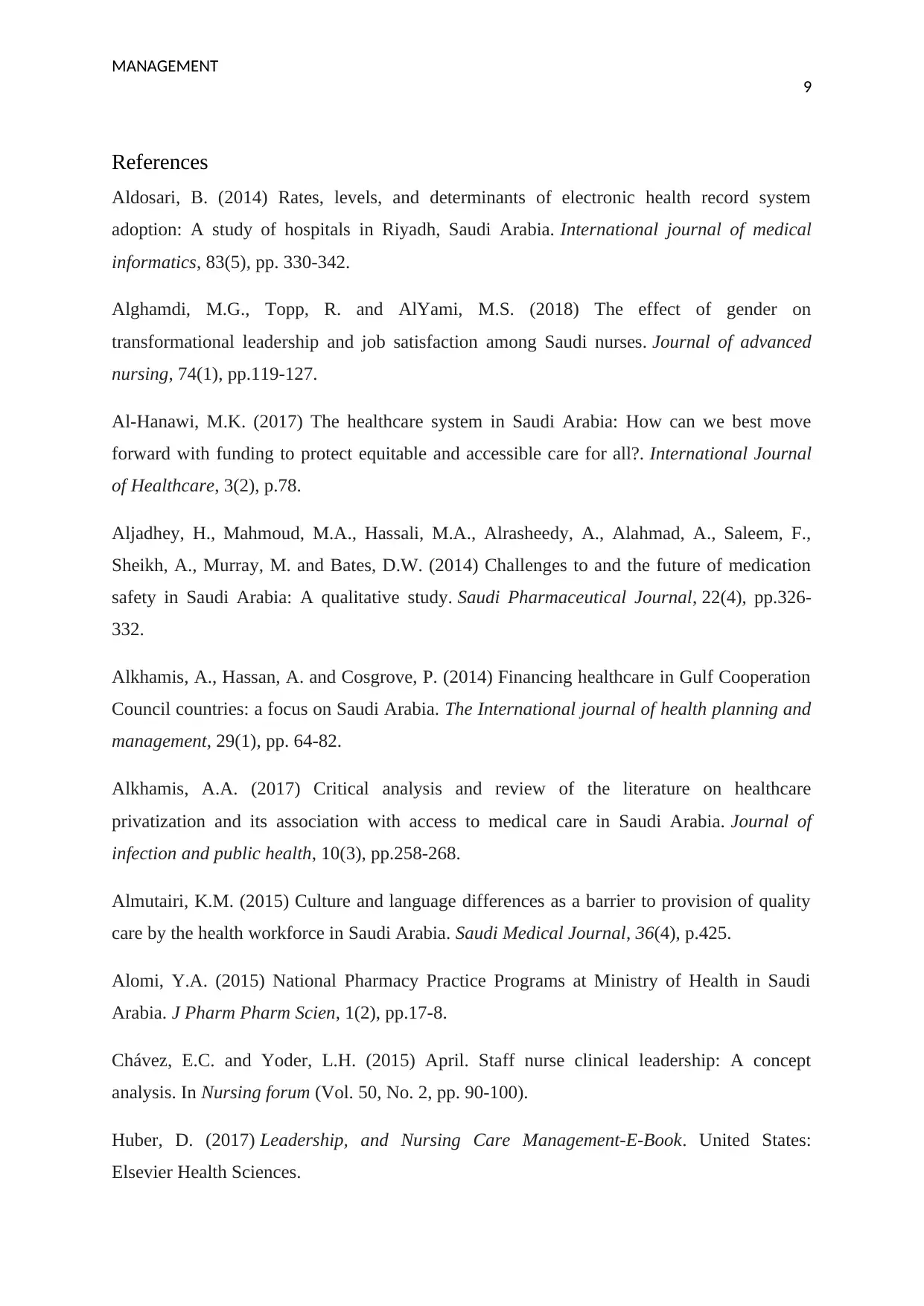
MANAGEMENT
9
References
Aldosari, B. (2014) Rates, levels, and determinants of electronic health record system
adoption: A study of hospitals in Riyadh, Saudi Arabia. International journal of medical
informatics, 83(5), pp. 330-342.
Alghamdi, M.G., Topp, R. and AlYami, M.S. (2018) The effect of gender on
transformational leadership and job satisfaction among Saudi nurses. Journal of advanced
nursing, 74(1), pp.119-127.
Al-Hanawi, M.K. (2017) The healthcare system in Saudi Arabia: How can we best move
forward with funding to protect equitable and accessible care for all?. International Journal
of Healthcare, 3(2), p.78.
Aljadhey, H., Mahmoud, M.A., Hassali, M.A., Alrasheedy, A., Alahmad, A., Saleem, F.,
Sheikh, A., Murray, M. and Bates, D.W. (2014) Challenges to and the future of medication
safety in Saudi Arabia: A qualitative study. Saudi Pharmaceutical Journal, 22(4), pp.326-
332.
Alkhamis, A., Hassan, A. and Cosgrove, P. (2014) Financing healthcare in Gulf Cooperation
Council countries: a focus on Saudi Arabia. The International journal of health planning and
management, 29(1), pp. 64-82.
Alkhamis, A.A. (2017) Critical analysis and review of the literature on healthcare
privatization and its association with access to medical care in Saudi Arabia. Journal of
infection and public health, 10(3), pp.258-268.
Almutairi, K.M. (2015) Culture and language differences as a barrier to provision of quality
care by the health workforce in Saudi Arabia. Saudi Medical Journal, 36(4), p.425.
Alomi, Y.A. (2015) National Pharmacy Practice Programs at Ministry of Health in Saudi
Arabia. J Pharm Pharm Scien, 1(2), pp.17-8.
Chávez, E.C. and Yoder, L.H. (2015) April. Staff nurse clinical leadership: A concept
analysis. In Nursing forum (Vol. 50, No. 2, pp. 90-100).
Huber, D. (2017) Leadership, and Nursing Care Management-E-Book. United States:
Elsevier Health Sciences.
9
References
Aldosari, B. (2014) Rates, levels, and determinants of electronic health record system
adoption: A study of hospitals in Riyadh, Saudi Arabia. International journal of medical
informatics, 83(5), pp. 330-342.
Alghamdi, M.G., Topp, R. and AlYami, M.S. (2018) The effect of gender on
transformational leadership and job satisfaction among Saudi nurses. Journal of advanced
nursing, 74(1), pp.119-127.
Al-Hanawi, M.K. (2017) The healthcare system in Saudi Arabia: How can we best move
forward with funding to protect equitable and accessible care for all?. International Journal
of Healthcare, 3(2), p.78.
Aljadhey, H., Mahmoud, M.A., Hassali, M.A., Alrasheedy, A., Alahmad, A., Saleem, F.,
Sheikh, A., Murray, M. and Bates, D.W. (2014) Challenges to and the future of medication
safety in Saudi Arabia: A qualitative study. Saudi Pharmaceutical Journal, 22(4), pp.326-
332.
Alkhamis, A., Hassan, A. and Cosgrove, P. (2014) Financing healthcare in Gulf Cooperation
Council countries: a focus on Saudi Arabia. The International journal of health planning and
management, 29(1), pp. 64-82.
Alkhamis, A.A. (2017) Critical analysis and review of the literature on healthcare
privatization and its association with access to medical care in Saudi Arabia. Journal of
infection and public health, 10(3), pp.258-268.
Almutairi, K.M. (2015) Culture and language differences as a barrier to provision of quality
care by the health workforce in Saudi Arabia. Saudi Medical Journal, 36(4), p.425.
Alomi, Y.A. (2015) National Pharmacy Practice Programs at Ministry of Health in Saudi
Arabia. J Pharm Pharm Scien, 1(2), pp.17-8.
Chávez, E.C. and Yoder, L.H. (2015) April. Staff nurse clinical leadership: A concept
analysis. In Nursing forum (Vol. 50, No. 2, pp. 90-100).
Huber, D. (2017) Leadership, and Nursing Care Management-E-Book. United States:
Elsevier Health Sciences.
Paraphrase This Document
Need a fresh take? Get an instant paraphrase of this document with our AI Paraphraser
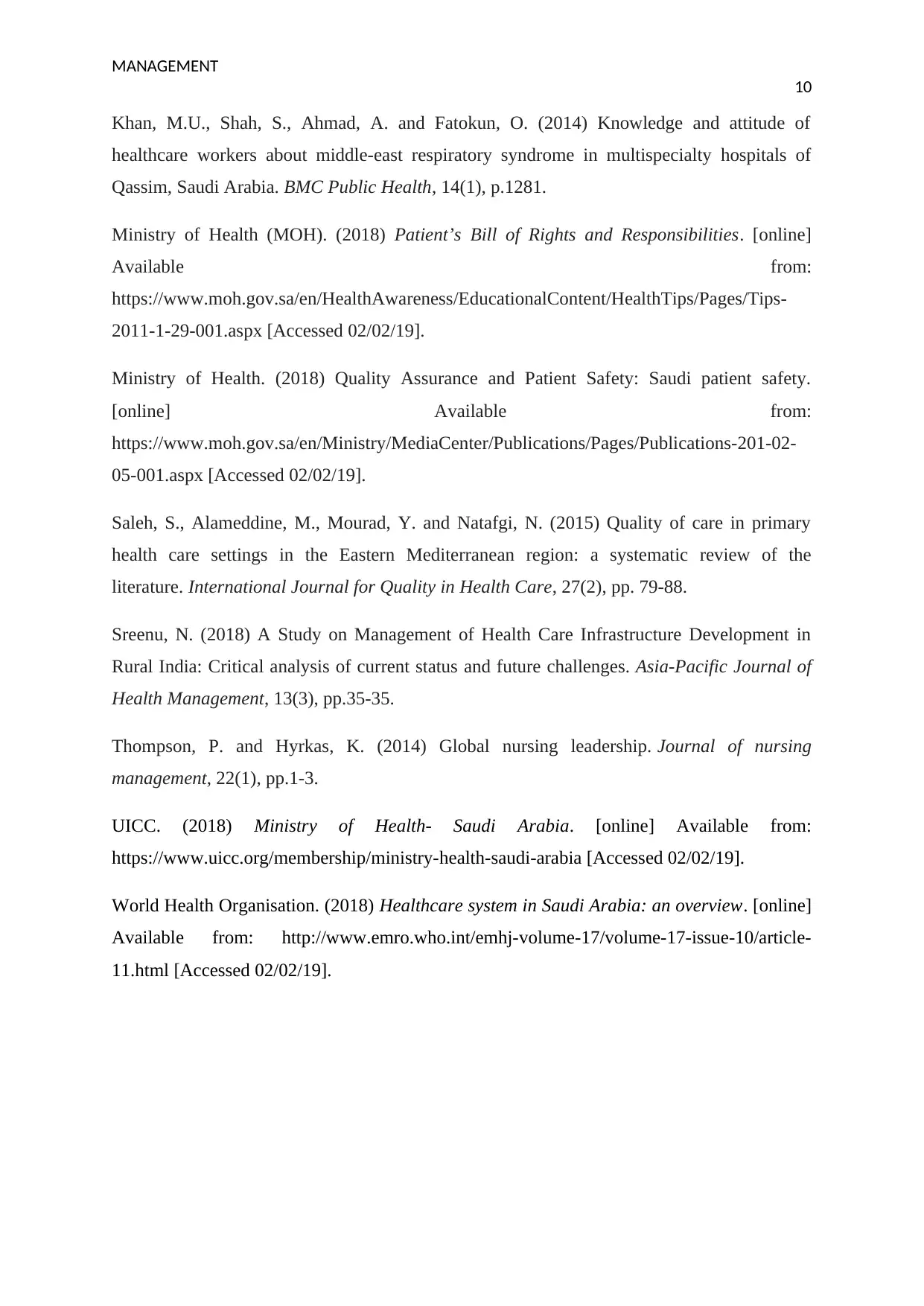
MANAGEMENT
10
Khan, M.U., Shah, S., Ahmad, A. and Fatokun, O. (2014) Knowledge and attitude of
healthcare workers about middle-east respiratory syndrome in multispecialty hospitals of
Qassim, Saudi Arabia. BMC Public Health, 14(1), p.1281.
Ministry of Health (MOH). (2018) Patient’s Bill of Rights and Responsibilities. [online]
Available from:
https://www.moh.gov.sa/en/HealthAwareness/EducationalContent/HealthTips/Pages/Tips-
2011-1-29-001.aspx [Accessed 02/02/19].
Ministry of Health. (2018) Quality Assurance and Patient Safety: Saudi patient safety.
[online] Available from:
https://www.moh.gov.sa/en/Ministry/MediaCenter/Publications/Pages/Publications-201-02-
05-001.aspx [Accessed 02/02/19].
Saleh, S., Alameddine, M., Mourad, Y. and Natafgi, N. (2015) Quality of care in primary
health care settings in the Eastern Mediterranean region: a systematic review of the
literature. International Journal for Quality in Health Care, 27(2), pp. 79-88.
Sreenu, N. (2018) A Study on Management of Health Care Infrastructure Development in
Rural India: Critical analysis of current status and future challenges. Asia-Pacific Journal of
Health Management, 13(3), pp.35-35.
Thompson, P. and Hyrkas, K. (2014) Global nursing leadership. Journal of nursing
management, 22(1), pp.1-3.
UICC. (2018) Ministry of Health- Saudi Arabia. [online] Available from:
https://www.uicc.org/membership/ministry-health-saudi-arabia [Accessed 02/02/19].
World Health Organisation. (2018) Healthcare system in Saudi Arabia: an overview. [online]
Available from: http://www.emro.who.int/emhj-volume-17/volume-17-issue-10/article-
11.html [Accessed 02/02/19].
10
Khan, M.U., Shah, S., Ahmad, A. and Fatokun, O. (2014) Knowledge and attitude of
healthcare workers about middle-east respiratory syndrome in multispecialty hospitals of
Qassim, Saudi Arabia. BMC Public Health, 14(1), p.1281.
Ministry of Health (MOH). (2018) Patient’s Bill of Rights and Responsibilities. [online]
Available from:
https://www.moh.gov.sa/en/HealthAwareness/EducationalContent/HealthTips/Pages/Tips-
2011-1-29-001.aspx [Accessed 02/02/19].
Ministry of Health. (2018) Quality Assurance and Patient Safety: Saudi patient safety.
[online] Available from:
https://www.moh.gov.sa/en/Ministry/MediaCenter/Publications/Pages/Publications-201-02-
05-001.aspx [Accessed 02/02/19].
Saleh, S., Alameddine, M., Mourad, Y. and Natafgi, N. (2015) Quality of care in primary
health care settings in the Eastern Mediterranean region: a systematic review of the
literature. International Journal for Quality in Health Care, 27(2), pp. 79-88.
Sreenu, N. (2018) A Study on Management of Health Care Infrastructure Development in
Rural India: Critical analysis of current status and future challenges. Asia-Pacific Journal of
Health Management, 13(3), pp.35-35.
Thompson, P. and Hyrkas, K. (2014) Global nursing leadership. Journal of nursing
management, 22(1), pp.1-3.
UICC. (2018) Ministry of Health- Saudi Arabia. [online] Available from:
https://www.uicc.org/membership/ministry-health-saudi-arabia [Accessed 02/02/19].
World Health Organisation. (2018) Healthcare system in Saudi Arabia: an overview. [online]
Available from: http://www.emro.who.int/emhj-volume-17/volume-17-issue-10/article-
11.html [Accessed 02/02/19].
1 out of 11
Related Documents
Your All-in-One AI-Powered Toolkit for Academic Success.
+13062052269
info@desklib.com
Available 24*7 on WhatsApp / Email
![[object Object]](/_next/static/media/star-bottom.7253800d.svg)
Unlock your academic potential
Copyright © 2020–2026 A2Z Services. All Rights Reserved. Developed and managed by ZUCOL.





